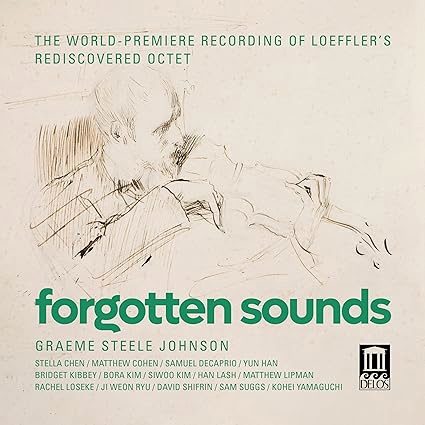

Claude Debussy (1862-1918): Prélude à l'après-midi d'un faune (arr. G.S. Johnson for chamber ensemble) Charles Martin Loeffler (1861-1935): Octet for two clarinets, harp, two violins, viola, cello and double bass (revised and reconstructed by G.S. Johnson) * Charles Martin Loeffler (1861-1935): Timbres oubliés (arr. G.S. Johnson for clarinet and harp) *World Premiere Recording
For any dedicated music lover, be they practitioner or listener, there are few delights to equal that of finding a new delicious work that can legitimately make claims to be a significant work of the composer. When that composer is unfairly neglected, that adds an extra element of excitement. So it is with Charles Martin Loeffler's long lost Octet, lovingly restored from hand written pages found in the Library of Congress by clarinetist Graeme Steele Johnson who leads the ensemble here in the performance.
As a composer Loeffler, sometimes referred to as the 'Dean of American Music' during his life, but almost totally forgotten after his death, has a late romantic vibe with momentary swirls of Brahms, Ravel, Debussy (a little) but never really fitting easily into any of those sharply defined styles. And maybe that's why his appeal dropped off during the early 20th century with its sharp turn to more atonal, or certainly polytonal styles reflecting the contortions of western society during the massive and terrible events of that century. He probably seemed too reminiscent of a society then passing into oblivion. In retrospect, assuming one listens simply for the joy of hearing beautiful sounds, well-crafted and enthusiastically played, this revival of his Octet is an enjoyable if not essential addition to the canon.
Recorded some 3-4 years prior to the Loeffler pieces, and with some different soloists, the recital starts with an arrangement of the Debussy Prélude à l'après-midi d'un faune, an undoubted masterpiece, arranged for 8 instruments (strings, woodwind, harp) by Graeme Steele Johnson. I enjoyed his arrangement a great deal, the added clarity of the smaller number of instruments making a great impression, particularly for me the harp parts which are played and recorded extremely well. Now and again, I miss the rich instrumentation of the full orchestral version, for example the delicate touches of the mini brass cymbals. But overall, I loved hearing the excellent double bass, flautists and clarinet (sometimes seamlessly leading into each other). The chamber sound world is an appropriate alternative for this work, a little like listening to the Erwin Stein arrangements of Mahler and others. There are no real orchestral swells of course, and I would not want to give up the orchestral version, but this is very satisfying.
When the Loeffler Octet starts, it's clearly a different level of composition. Not the level of distinctiveness of Debussy, that would be asking a lot indeed. But the music is easy to listen to, it falls gently on the ear and has some beautiful moments reminding me of elements of Brahms, yet not quite Brahms (the instruments such as prominent harp lead one away from that), but it has that warmth and glow of the second symphony.
The accompanying booklet puts it well when it says, "the collision of styles in Loeffler's Octet embodies the groping for national identity happening at the dawn of American music". In fact, the booklet presents the fascinating story of the finding of the handwritten pages of the score and its careful reconstruction. It is a worthy accompaniment to the release itself.
The first movement's main tunes are quite endearing, almost like a gentle, not slow but not brisk walk on a sunny afternoon in a picturesque park. It feels more andante than Allegro Moderato in spirit. It is followed by a more yearning Adagio Molto, more in the Wagnerian spirit and style, although without the mythic weight of that composer's music. More Siegfried Idyll than Siegfried in fact, though again not with that former work's incredible melodic invention.
The final movement, starting in an Andante, but containing some of the fastest music of the overall piece, features a folk-dance influenced main section, and enables the excellent musicians to show their ensemble capabilities. A short movement for clarinet and harp ends the recital and gives the title to the overall release.
In the end, while the Loeffler pieces seem to me to be of a somewhat lesser quality than the Debussy, the composer not quite in the first rank, yet the compositions here are clearly very competently and confidently written. The generous spirit of the compositions, the assuredness of the playing and enthusiastic advocacy by the excellent instrumentalists makes this release a valuable one. It provides a fascinating example of the dedication of musicians who love music and have displayed a heart-warming spirit of discovery along with their technical capabilities.
Ian Orbell - June 2024 Octet - Opening Allegro Moderato